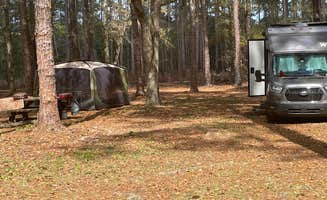Dispersed camping options near Altha, Florida concentrate in the Apalachicola National Forest, which covers over 632,000 acres of pine flatwoods and cypress swamps. The region experiences hot, humid summers with temperatures regularly exceeding 90°F and mild winters with occasional frost. Seasonal weather patterns affect road conditions, with summer thunderstorms creating muddy access routes to remote camping areas.
What to do
Fishing opportunities: Several boat ramps near Porter Lake Dispersed Camp provide access to productive waterways. "The river is beautiful to boat or kayak and fish," notes one camper who visited the area. Water levels fluctuate seasonally, affecting accessibility and fishing conditions.
Wildlife observation: Dawn and dusk offer prime wildlife viewing times throughout the forest. "At night total quiet just the wildlife," reports a Porter Lake visitor, indicating good opportunities for spotting nocturnal species. Bring binoculars for bird watching, particularly during spring migration periods.
Off-road exploration: Forest service roads throughout the region allow for extensive exploration by vehicle or foot. At Buckhorn Hunt Camp, one visitor notes "roads in are OK," though conditions vary significantly with weather. Four-wheel drive vehicles are recommended after rain events.
What campers like
Solitude and quiet: Outside hunting seasons, many dispersed sites see minimal visitor traffic. A Buckhorn Hunt Camp visitor reports it's "not all that busy outside of hunting season," making spring and early summer ideal for those seeking solitude. Weekday visits typically offer the most peaceful experience.
Basic amenities: Though limited, some sites offer rudimentary facilities. "Four spots have a picnic table. Spots are reasonably private," notes a camper at Buckhorn Hunt Camp. Most hunt camps lack permanent toilet facilities, though some have had portable units in the past.
Escape from urban environments: The remote location provides a complete break from city life. One Porter Lake camper describes it as a "nice spot for a quick getaway from city life," noting the stark contrast to urban settings despite occasional road noise near some sites.
What you should know
Distance from services: Free camping near Altha, Florida means significant isolation from conveniences. One Porter Lake camper states the campground is "at least 30 miles either way on F13 (dirt road to campground) and other routes to any type of civilization." Bring all necessary supplies for your entire stay.
Road conditions: Access roads can be challenging, particularly for low-clearance vehicles. Logging operations affect road quality and noise levels. "There are a lot of logging trucks who use the road during the day and other vehicles," reports a Porter Lake visitor, indicating weekday daytime noise should be expected.
Water availability: While some sites have water sources, potability is questionable. At Cliff Lake Hunt Camp in Apalachicola Forest, no water sources exist, requiring campers to carry in all water needs. At Porter Lake, campers note "They say non potable but there are no signs" regarding the water spigot.
Tips for camping with families
Safety planning: Cell service is unreliable throughout much of the forest. Create a detailed trip plan including expected return times and share with someone not traveling with you. The remote nature of dispersed camping near Altha requires extra safety precautions with children.
Bug protection: Mosquitoes and ticks are prevalent, especially during warmer months. "Nice spot for a quick getaway from city life," mentions a Porter Lake camper who recommends bringing insect repellent containing DEET for effective protection against biting insects common in the area.
Activity preparation: Limited recreational infrastructure means bringing your own entertainment. Twin Poles Hunt Camp provides open spaces for games and activities, but families should pack cards, field guides, and outdoor games to keep children engaged during downtime.
Tips from RVers
Size limitations: Most forest roads accommodate smaller RVs and trailers only. Large motorhomes and fifth wheels face significant challenges on narrow, unpaved forest roads, especially during wet conditions. Camper vans and truck campers navigate the terrain most successfully.
Self-containment: No hookups or dump stations exist at any dispersed camping areas near Altha. White Oak Landing and Hunt Camp requires complete self-sufficiency for overnight stays. RVers should arrive with full water tanks and empty waste tanks, prepared for dry camping.
Leveling challenges: Uneven terrain at most sites requires leveling blocks or systems. Bring multiple leveling options as sites vary in slope and surface consistency. Test stabilizer deployment before setting up camp fully to ensure stability on potentially soft ground.


